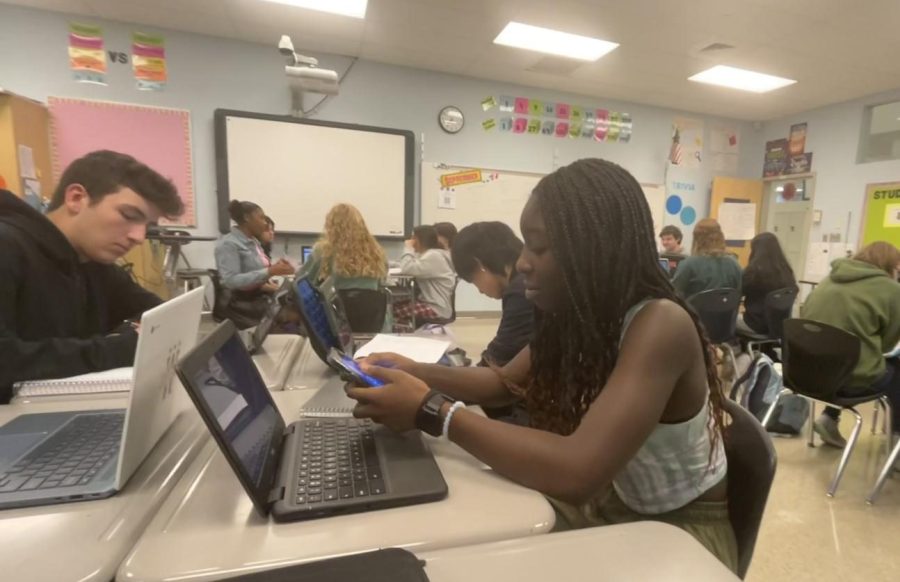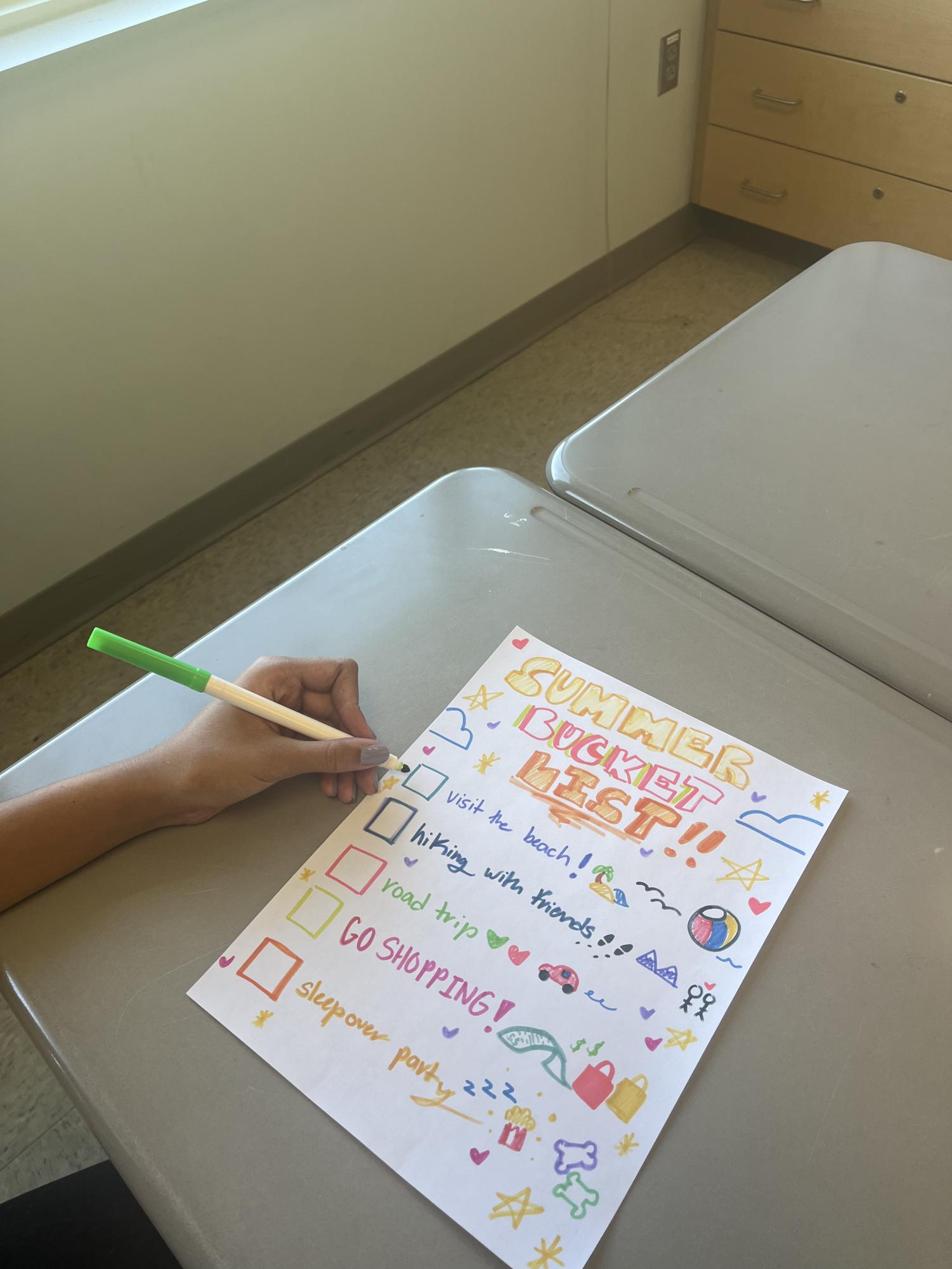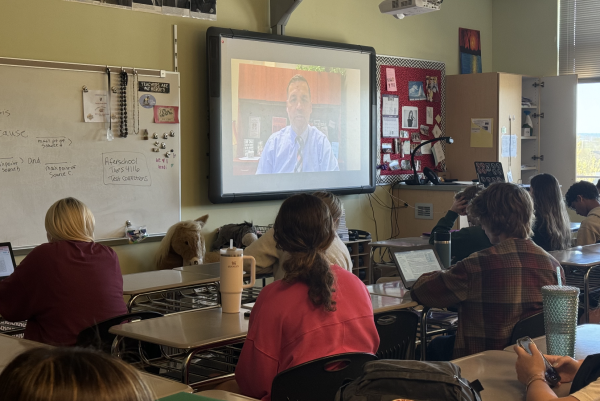MCPS updates phone policy, raises controversy about cell use in schools
Josslyn Quansah on her phone during first period Algebra 2 Honors with Ms. Klein.
October 3, 2022
Students often debate whether or not phones should be allowed in classrooms or even in school. This topic has created on-going controversy, as many have differences in opinion on whether phones are needed in schools.
Discussion about banning phones in Frederick County Public Schools (FCPS) is not new and had been previously proposed by former Board of Education member Lois Jarman in 2019. Jarman supported the idea of requiring students to follow the “off and away” policy.
Jarman believed the Frederick County policy was unorganized when compared to other counties. The FCPS policy let individual schools decide how to navigate electronics, and Jarman wanted to finally take action.
Although this idea was raised in 2019, the debate was renewed when neighboring Montgomery County Public Schools (MCPS) decided to update their restrictions on the use of electronic devices during the school day. Unless exempted, students are required to keep devices away during school hours. Those excused are students with special needs who need the assistance and those with indvidualized education plans (IEPs).
This policy now applies to all electronics not issued by MCPS. This decision by MCPS also allows high school principals to decide if students at their school can use their phones during lunch and in between classes. I think [FCPS] should definitely take a look at [our phone policy] … we’re going through our policies, and we’re looking at parent and student feedback, — Jason Johnson
This revision of Montgomery County’s phone policy has raised questions about whether or not phones should be banned in schools and the prospect of changing local policy.
Currently, the Frederick County Public School (FCPS) electronic devices policy allows middle and high school students to use their devices in school when instructed.
Jason “Mr. J” Johnson, a member of the FCPS Board of Education, supports the idea of moderate use of cell phones in the classroom and updating the FCPS phone policy.
“I think we should definitely take a look at it in terms of making sure we’re actually doing it now. We’re going through our policies, and we’re looking at parent and student feedback, and that’s why it’s important for parents to email the board,” said Johnson.
Frederick county acknowledges that the use of electronic devices in school is a privilege, not a right. The FCPS policy additionally states that these privileges can be revoked at any time if students disrupt a learning environment, create safety concerns, break the law, disturb academic honesty, violate privacy or use a device without a teacher’s permission.
Naturally, some students disobey existing rules, becoming codependent on their phones.
Even so, many students believe allowing phones in school should not even be a open for debate. One of the biggest arguments for allowing phones in schools is safety.
“It comes down to a safety concern,” said Linganore High School sophomore Genevieve Vlha.
Sophomore Kim Kelsie agrees. “If something were to happen and students did not have their phone, they wouldn’t be able to contact anyone for help … In the U.S. we have a lot of school shootings, so you always need to be able to contact your parents,” said Kelsie.
Students also believe it is a matter of posession of personal property and that their phone is theirs to hold on to. As Kailyn Nanda said, “[We] have the right to carry [our] own property.”
Although the majority believe that phones should be allowed in school, there are differing opinions when it comes to phones in the classroom.
“[Phones are] not really doing you more good, but I don’t think it would cause harm, and it’s irrelevant in a learning area,” Nanda said.
Kelsie shared a different opinion about phone use in the classroom when she cited a personal experience in which she forgot her calculator and had to use her phone.
Contrary to Kelsie’s idea that phones can be helpful, some teachers believe that it is just too distracting for the classroom. Randi Kirkland, an English teacher at Linganore, shared her concerns that her classroom is “consumed by phones.”
“[I’ll] walk around [and] at times at least 30% of the students are on a phone,” said Kirkland.
This leads her to remind her students to have their phones off and away which is a “waste of [her] energy.” Although Kirkland believes there are both pros and cons towards the idea of banning phones in the classroom, she believes that it would have an overall positive effect.
“We just have to have self discipline,” Kirkland said.
As a parent, Kirkland also revealed she worries for her own children being distracted by their phones and how their critical thinking skills may suffer. “I worry that students just forget–and my kids forget– how to just be human beings for a lil while y’know and not phone out head down,” said Kirkland.
Current Frederick County Board of Education members also have individual opinions on phones in school. Board member Karen Yoho revealed that the Board has not had an in-depth discussion on cell phones during her time. When discussing this topic she said she sees both sides.
“We don’t want to cut parents [and] students off from being safe, but we want teachers to be able to teach,” said Yoho.
Aware that technology “is such an integral part of our everyday life,” she believes that outright banning phones in school would “have the perception of harm.” This leads Yoho to be all in favor of “finding ways that we [do] not rely on phone use and [finding] a safe way for students to store them.”
She even shares a suggestion for phones in classrooms from a teacher in Baltimore city. In this teacher’s classroom, students would “put their phone in a pouch that gets locked, [while] the teacher has a magnet that they wear so the bag can get released quickly [if needed].”
As a computer science teacher, Johnson revealed that phones are sometimes used regarding programming in his classroom. He acknowledged that there have been times where students have used their phones “to save lives,” and explains the meaning of moderate phone use as the idea “each classroom would have their own set of rules for their phones.”
“We should, as a county, train our students in professional ways to use technology because technology is not going away,” said Johnson. “Devices are always changing,” so the board should “look at the [phone] policy and keep it updated.”
Overall, cell phone policies within public schools impact a variety of constituent groups, affecting students, parents and staff. Many factors need to be considered when deciding a school policy. This makes the use of electronic devices in school a contentious debate and perhaps one in need of discussion by Frederick County Public Schools and the Frederick County Board of Education.














